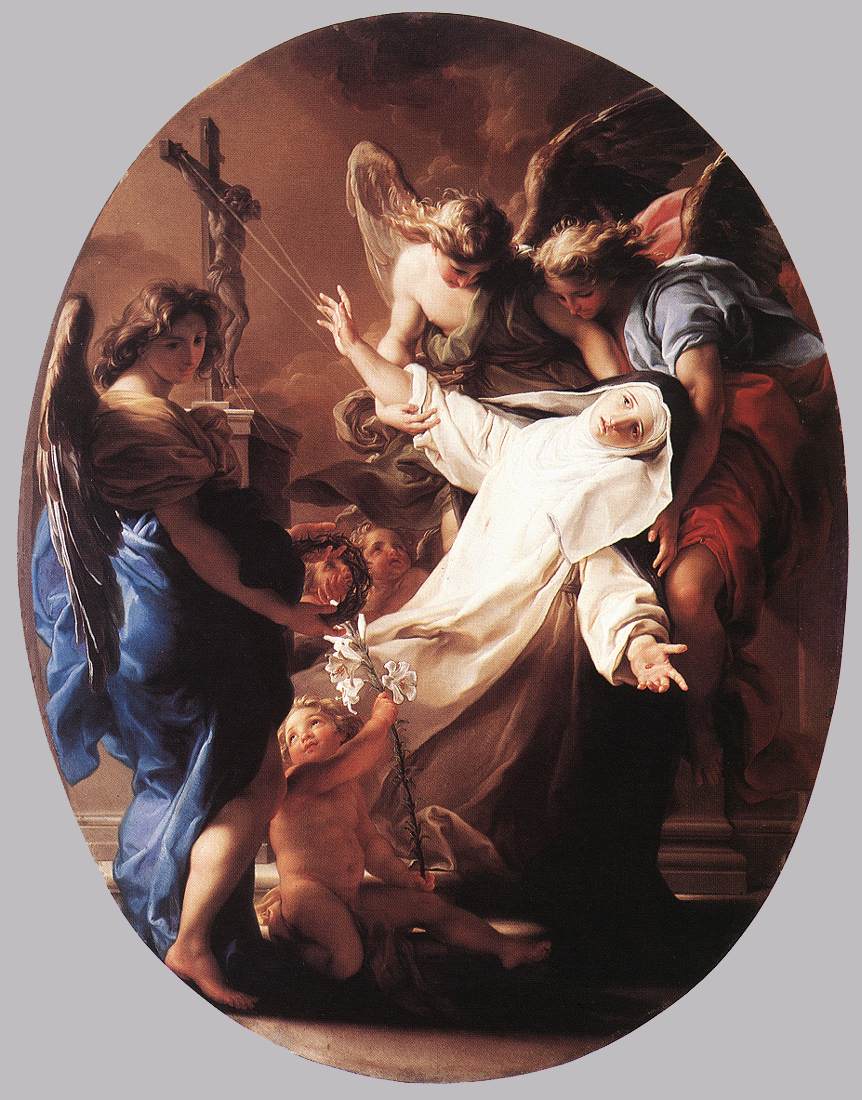21. He that has my commandments, and keepeth them, he it is that loves me: and he that loves me shall be loved of my Father, and I will love him, and will manifest myself to him.
ALCUIN. By love, and the observance of His commandments, that will be perfected in us which He has begun, viz. that we should be in Him, and He in us. And that this blessedness may be understood to be promised to all, not to the Apostles only, He adds, He that has My commandments and keeps them, he it is that loves Me.
AUG. He that has them in , and keeps them in life; he that has them in words, and keeps them in works; he that has them by hearing, and keeps them by doing; he that has them by doing, and keeps them by persevering, he it is that loves Me. Love must be strewn by works, or it is a mere barren name.
THEOPHYL. As if He said, You think that by sorrowing, as you do, for my death you prove your affection; but I esteem the keeping of My commandments the evidence of love. And then He shows the privileged state of one who loves: And he that loves Me shall be loved of My Father, and I will love him.
AUG. I will love him, as if now He did not love him. What means this? He explains it in what follows: And will manifest Myself to him, i.e. I love him so far as to manifest Myself to him; so that, as the reward of his faith, he will have sight. Now He only loves us so that we believe; then He will love us so that we see. And whereas we love now by believing that which we shall see, then we shall love by seeing that which we have believed.
AUG. He promises to show Himself to them that love Him as God with the Father, not in that body which He bore upon earth, and which the wicked saw.
THEOPHYL. For, as after the resurrection He was to appear to them in a body more assimilated to His divinity, that they might not take Him then for a spirit, or a phantom, He tells them now beforehand not to have misgivings upon seeing Him, but to remember that He shows Himself to them as a reward for their keeping His commandments; and that therefore they are bound ever to keep them, that they may ever enjoy the sight of Him.
22. Judas said to him, not Iscariot, Lord, how is it that you will manifest yourself to us, and not to the world?
23. Jesus answered and said to him, If a man love me, he will keep my words: and my Father will love him, and we will come to him, and make our abode with him.
24. He that loves me not keeps not my sayings: and the word which you hear is not mine, but the Father's which sent me.
25. These things have I spoken to you, being yet present with you.
26. But the Comforter, which is the Holy Ghost, whom the Father will send in my name, he shall teach you all things, and bring all things to your remembrance whatsoever I have said to you.
27. Peace I leave with you, my peace I give to you: not as the world gives, give I to you.
AUG. Our Lord having said, A little while, and the world sees Me no more: but you shall see Me: Judas, not the traitor named Iscariot, but he whose Epistle is read among the Canonical Scriptures, asks His meaning: Judas said to Him, not Iscariot, Lord, how is it that you will manifest Yourself to us, and not to the world?
Our Lord in reply explains why He manifests Himself to His own, and not to aliens, viz. because the one love Him, the other do not. Jesus answered and said to him, If a man love Me, he will keep My words.
GREG. If you would prove your love, show your works. The love of God is never idle; whenever it is, it does great things: if it do not work, it is not.
AUG. Love distinguishes the saints from the world: it makes men to be of one mind in an house; in which house the Father and the Son take their abode; who give that love to those, to whom in the end they will manifest themselves. For these is a certain inner manifestation of God, unknown to the ungodly, to whom there is no manifestation made of the Father and the Holy Spirit, and only could be of the Son in the flesh; which latter manifestation is not as the former, being only for a little while, not for ever, for judgment, not for joy, for punishment, not for reward.
And We will come to him: They come to us, in that we go to Them; They come by succoring, we go by obeying; They come by enlightening, we go by contemplating; They come by filling, we go by holding: so Their manifestation to us is not external, but inward; Their abode in us not transitory, but eternal. It follows, And will make Our abode with him.
GREG. Into some hearts He comes, but not to make His abode with them. For some feel compunction for a season and turn to God, but in time of temptation forget that which gave them compunction, and return to their former sins, just as if they had never lamented them. But whoever loves God truly, into his heart the Lord both comes, and also makes His abode therein: for the love of the Godhead so penetrates him, that no temptation withdraws him from it. He truly loves, whose mind no evil pleasure overcomes, through his consent thereto.
AUG. But while the Father and the Son make Their abode with the loving, soul, is the Holy Spirit excluded? What means that which is said of the Holy Spirit above: He dwells with you, and shall be in you, but that the Spirit makes His abode with us? Unless indeed a man be so absurd as to think that when the Father and the Son come, the Holy Spirit departs, as if to give place to His superiors.
Yet even this carnal thought is met by Scripture, in that it says, Abide with you for ever. He will therefore be in the same abode with Them for ever. As He did not come without Them, so neither They without Him. As a consequence of the Trinity, acts are sometimes attributed to single persons in it: but the substance of the same Trinity demands, that in such acts the presence of the other Persons also be implied.
GREG. In proportion as a man's love rests upon lower things, in that proportion is he removed from heavenly love: He that loves Me not, keeps not My sayings. To the love then of our Maker, let the tongue, mind, life bear witness.
CHRYS. Or thus Judas thought that he should , see Him, as we see the dead in sleep: How is it, that you will manifest Yourself to us, and not to the world? meaning, Alas, as you art to die, you will appear to us but as one dead. To correct this mistake, He says, I and My Father will come to him, i.e. I shall manifest Myself, even as My Father manifests Himself. And will make our abode with Him; which is not like a dream. It follows, And the word which you hear is not Mine, but the Father's which sent Me; i.e. He that hears not My words, inasmuch as he loves not Me, so loves he not My Father. This He says to show that He spoke nothing which was not the Father's, nothing beside what seemed good to the Father.
AUG. And perhaps there is a distinction at bottom, since He speaks of His sayings, when they are His own, in the plural number; as when He says, He that loves Me not, keeps not My sayings: when they are not His own, but the Father's, in the singular, i.e. as the Word, which is Himself. For He is not His own Word, but the Father's, as He is not His own image, but the Father's, or His own Son, but the Father's.
CHRYS. These things have I spoken to you, being yet present with you. Some of these things were obscure, and not understood by the disciples.
AUG The abode He promised them hereafter is altogether a different one from this present abode He now speaks of. The one is spiritual and inward, the other outward, and perceptible to the bodily sight and hearing.
CHRYS. To enable them to sustain His bodily departure more cheerfully, He promises that that departure shall be the source of great benefit; for that while He was then in the body, they could never know much, because the Spirit would not have come: But the Comforter, which is the Holy Ghost, Whom the Father will send in My name, He shall teach you all things, and bring all things to your remembrance, whatsoever I have said to you.
GREG. Paraclete is Advocate, or Comforter. The Advocate then intercedes with the Father for sinners, when by His inward power He moves the sinner to pray for himself. The Comforter relieves the sorrow of penitents, and cheers them with the hope of pardon.
CHRYS. He often calls Him the Comforter, in allusion to the affliction in which they then were.
DIDYMUS. The Savior affirms that the Holy Spirit is sent by the Father, in His, the Savior's, name; which name is the Son. Here an agreement of nature and propriety, so to speak, of persons is strewn. The Son can come in the Father's name only, consistently with the proper relationship of the Son to the Father, and the Father to the Son.
No one else comes in the name of the Father, but in the name of God, of the Lord, of the Almighty, and the like. As servants who come in the name of their Lord, do so as being the servants of that Lord, so the Son who comes in the name of the Father, bears that name as being the acknowledged only-begotten Son of the Father. That the Holy Spirit then is sent in the Son's name, by the Father, shows that He is in unity with the Son: whence He is said too to be the Spirit of the Son, and to make those sons by adoption, who are willing to receive Him.
The Holy Spirit then, Who comes in the name of the Son from the Father, shall teach them, who are established in the faith of Christ, all things; all things which are spiritual, both the understanding of truth, and the sacrament of wisdom. But He will teach not like those who have acquired an art or knowledge by study and industry, but as being the very art, doctrine, knowledge itself. As being this Himself, the Spirit of truth will impart the knowledge of divine things to the mind.
GREG. Unless the Spirit be present to the mind of the hearer, the word of the teacher is vain. Let none then attribute to the human teacher, the understanding which follows in consequence of his teaching: for unless there be a teacher within, the tongue of the teacher outside will labor in vain. Nay even the Maker Himself does not speak for the instruction of man, unless the Spirit by His unction speaks at the same time.
AUG. So then the Son speaks, the Holy Spirit teaches: when the Son speaks we take in the words, when the Holy Spirit teaches, we understand those words. The whole Trinity indeed both speaks and teaches, but unless each person worked separately as well, the whole would be too much for human infirmity to take in.
GREG. But why is it said of the Spirit, He shall suggest all stings to you: to suggest being the office of an inferior? The word is used here, as it is used sometimes, in the sense of supplying secretly. The invisible Spirit suggests, not because He takes a lower place in teaching, but because He teaches secretly.
AUG. Suggest, i.e. bring to your remembrance. Every wholesome hint to remember that we receive is of the grace of the Spirit.
THEOPHYL. The Holy Spirit then was both to teach and to bring to remembrance: to teach what Christ had forborne to tell His disciples, because they were not able to bear it; to bring to remembrance what Christ had told them but which on account of its difficulty, or their slowness of understanding, they were unable to remember.
CHRYS. Peace I leave with you, My peace I give to you: He says this to console His disciples, who were now troubled at the prospect of the hatred and opposition which awaited them after His departure.
AUG. He left no peace in this world; in which we conquer the enemy, and have love one to another: He will give us peace in the world to come, when we shall reign without an enemy, and where we shall be able to avoid disagreement. This peace is Himself, both when we believe that He is, and when we shall see Him as He is. But why does He say, Peace I leave with you, without the My, whereas He puts in My in, My peace 1 give to you? Are we to understand My in the former; or is it not rather left out with a meaning?
His peace is such peace as He has Himself; the peace which He left us in this world is rather our peace than His. He has nothing to fight against in Himself, because He has no sin: but ours is a peace in which we still say, Forgive us our debts (Matt 6:12). And in like manner we have peace between ourselves, because we mutually trust one another, that we mutually love one another. But neither is that a perfect peace; for we do not see into each other's minds. I could not deny however that these words of our Lord's may be understood as a simple repetition.
He adds, Not as the world gives, give I unto you: i.e. not as those men, who love the world, give. They give themselves peace, i.e. free, uninterrupted enjoyment of the world. And even when they allow the righteous peace, so far as not to persecute them, yet there cannot be true peace, where there is no true agreement, no union of heart.
CHRYS. External peace is often even hurtful, rather than profitable to those who enjoy it.
AUG. But there is a peace which is serenity of thought, tranquillity of mind, simplicity of heart, the bond of love, the fellowship of charity. None will be able to come to the inheritance of the Lord who do not observe this testament of peace; none be friends with Christ, who are at enmity with the Christians.
Catena Aurea John 14

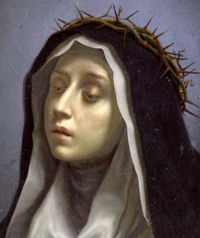
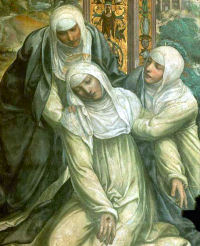 Catherine, the youngest of twenty-five children, was born in Siena on March 25, 1347. During her youth she had to contend with great difficulties on the part of her parents. They were planning marriage for their favorite daughter; but Catherine, who at the age of seven had already taken a vow of virginity, refused. To break her resistance, her beautiful golden brown tresses were shorn to the very skin and she was forced to do the most menial tasks. Undone by her patience, mother and father finally relented and their child entered the Third Order of St. Dominic.
Catherine, the youngest of twenty-five children, was born in Siena on March 25, 1347. During her youth she had to contend with great difficulties on the part of her parents. They were planning marriage for their favorite daughter; but Catherine, who at the age of seven had already taken a vow of virginity, refused. To break her resistance, her beautiful golden brown tresses were shorn to the very skin and she was forced to do the most menial tasks. Undone by her patience, mother and father finally relented and their child entered the Third Order of St. Dominic. 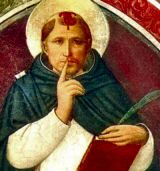 Peter entered the Dominican Order in 1221, the year when St. Dominic died. He was a zealous preacher, and as Inquisitor converted many heretics. While attending school at the age of seventeen, he was asked by his uncle, a heretic, what he was learning. Candidly the boy replied, "The Apostles' Creed." Neither threats nor honeyed words from father and uncle were able to shake the boy's steadfast faith. Years later, when death was near, he once more recited the Apostles' Creed that he prayed so courageously in his youth. The mortal stab soon fell, and he received the martyr's crown.
Peter entered the Dominican Order in 1221, the year when St. Dominic died. He was a zealous preacher, and as Inquisitor converted many heretics. While attending school at the age of seventeen, he was asked by his uncle, a heretic, what he was learning. Candidly the boy replied, "The Apostles' Creed." Neither threats nor honeyed words from father and uncle were able to shake the boy's steadfast faith. Years later, when death was near, he once more recited the Apostles' Creed that he prayed so courageously in his youth. The mortal stab soon fell, and he received the martyr's crown. 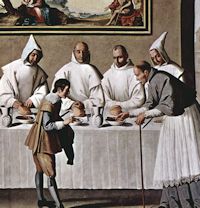 St. Hugh was a prince related to the sovereign house of the dukes of Burgundy, and had his education under the tuition of his pious Mother, and under the care of Hugh, Bishop of Auxerre, his great-uncle. From his infancy he was exceedingly given to prayer and meditation, and his life was remarkably innocent and holy.
St. Hugh was a prince related to the sovereign house of the dukes of Burgundy, and had his education under the tuition of his pious Mother, and under the care of Hugh, Bishop of Auxerre, his great-uncle. From his infancy he was exceedingly given to prayer and meditation, and his life was remarkably innocent and holy. 

